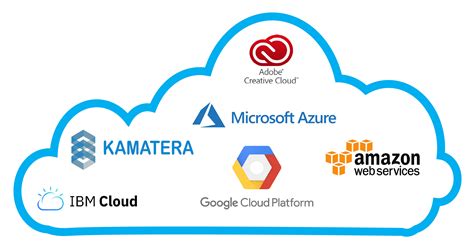Cloud Server Service Providers: Choosing the Right Partner for Your Business
As businesses increasingly rely on cloud technologies for their operations, the demand for reliable and efficient cloud server service providers has skyrocketed. Cloud servers offer numerous benefits, including scalability, flexibility, and cost-effectiveness, making them an attractive option for businesses of all sizes. However, with a plethora of cloud service providers available in the market, choosing the right partner can be a daunting task. In this article, we will explore the essential factors to consider when selecting a cloud server service provider and highlight some top players in the industry.

Why Cloud Server Service Providers?
Cloud server service providers offer businesses an alternative to traditional on-premises servers. With cloud servers, businesses can access their data and applications remotely through the internet, eliminating the need for physical infrastructure and reducing operational costs. Additionally, cloud servers offer enhanced security, reliability, and performance, allowing businesses to focus on their core activities without worrying about server maintenance and upgrades.
The Importance of Choosing the Right Cloud Server Service Provider
Choosing the right cloud server service provider is crucial for the success of your business. A reliable and efficient provider will ensure smooth operations, data security, and prompt customer support. On the other hand, a poor choice can result in data breaches, downtime, and loss of revenue. To make an informed decision, consider the following factors:
1. Reliability and Uptime Guarantee
A reliable cloud server service provider should offer a robust infrastructure with a high uptime guarantee. Uptime refers to the amount of time a server is operational and accessible to users. Look for providers that promise at least 99.9% uptime, ensuring minimal disruptions to your business operations.
2. Scalability and Flexibility
As your business grows, so will your IT infrastructure needs. A good cloud server service provider should offer scalable solutions that allow you to easily increase or decrease your resources as per your requirements. This flexibility ensures that you only pay for what you need and can quickly adapt to changing business demands.
3. Security Measures
Data security is a top concern for businesses when it comes to cloud computing. Ensure that your chosen cloud server service provider has robust security measures in place, including encryption, firewall protection, intrusion detection systems, and regular data backups. Additionally, look for providers that comply with industry standards and have certifications such as ISO 27001 or SOC 2.
4. Data Storage and Backup
Consider the storage capacity and backup options provided by the cloud server service provider. Ensure that they have sufficient storage space to accommodate your current data needs and offer reliable backup solutions to protect your data from loss or corruption. Regular backups are essential to ensure business continuity in case of any unforeseen events.
5. Performance and Speed
The performance and speed of your cloud server infrastructure can significantly impact your business operations. Look for providers that offer high-performance hardware, fast network connectivity, and low latency. A slow or unreliable server can lead to decreased productivity and frustrated users.
6. Cost and Pricing Model
While cost should not be the sole deciding factor, it is important to consider your budget when choosing a cloud server service provider. Evaluate the pricing models offered, such as pay-as-you-go, monthly subscription, or resource-based pricing, to determine the most cost-effective option for your business. Additionally, consider any additional fees for data transfers, storage, or technical support.
Top Cloud Server Service Providers
Now that we have discussed the essential factors to consider, let’s explore some of the top cloud server service providers in the industry:
1. Amazon Web Services (AWS)
As one of the pioneers in cloud computing, AWS has established itself as a leader in the industry. With a wide range of services and global data center locations, AWS offers high scalability, reliability, and security. Their comprehensive suite of cloud solutions caters to businesses of all sizes and industries.
2. Microsoft Azure
Microsoft Azure is another major player in the cloud server market. With a strong focus on integration with existing Microsoft tools and services, Azure offers a seamless transition for businesses already using Microsoft products. Their global presence, extensive service portfolio, and strong security features make Azure a popular choice for enterprises.
3. Google Cloud Platform (GCP)
Google Cloud Platform is known for its robust infrastructure, advanced analytics capabilities, and artificial intelligence services. GCP offers a comprehensive set of cloud services, including compute, storage, networking, and machine learning. With Google’s reputation for innovation, GCP is an attractive option for businesses looking to leverage cutting-edge technologies.
4. IBM Cloud
IBM Cloud offers a range of cloud services, including bare metal servers, virtual servers, and container services. Their focus on hybrid cloud solutions allows organizations to seamlessly integrate on-premises and cloud environments. IBM’s strong security features and compliance offerings make it a preferred choice for industries with strict regulatory requirements.
5. Oracle Cloud Infrastructure (OCI)
Oracle Cloud Infrastructure provides businesses with highly scalable and secure cloud services. Their offerings include compute, storage, networking, and database services. Oracle’s focus on performance and their commitment to customer support make OCI a viable option for businesses in need of enterprise-grade cloud solutions.
Frequently Asked Questions (FAQs)
1. What is cloud server hosting?
Cloud server hosting refers to the provision of virtual servers by a service provider through the internet. Instead of having physical hardware on-site, businesses can access their servers and data remotely, eliminating the need for maintenance and costly infrastructure.
Answer
Cloud server hosting allows businesses to easily scale their resources, pay for what they use, and have access to robust security measures provided by the service provider.
2. How does cloud server hosting work?
Cloud server hosting works by utilizing a network of interconnected physical servers that are virtualized to create multiple virtual servers. These virtual servers are then allocated to users based on their resource requirements. The entire infrastructure is managed and maintained by the cloud server service provider.
Answer
Users can access their virtual servers through a remote connection, usually through a web-based control panel or remote desktop access. The service provider takes care of hardware maintenance, data backups, and server upgrades, allowing businesses to focus on their core activities.
3. What are the advantages of using cloud server service providers?
Cloud server service providers offer several advantages, including:
- Scalability: Businesses can easily scale their resources up or down based on their needs without investing in additional hardware.
- Flexibility: Cloud servers provide the flexibility to access data and applications from anywhere, anytime, using any device.
- Cost-effectiveness: Pay-as-you-go pricing models allow businesses to only pay for the resources they use, reducing operational costs.
- Data security: Cloud service providers offer robust security measures and compliance certifications to ensure the safety of sensitive data.
- Reliability: With high uptime guarantees and redundant infrastructure, cloud servers offer reliable and uninterrupted service.
4. How do I choose the right cloud server service provider?
Choosing the right cloud server service provider requires careful consideration of factors such as reliability, scalability, security measures, performance, cost, and support. Identify your business needs and evaluate different providers based on their offerings and compatibility with your requirements.
Answer
Consider conducting a proof of concept or trial period to assess the provider’s services firsthand. Additionally, read reviews, seek recommendations, and compare pricing models to make an informed decision.
5. Can I migrate my existing servers to a cloud server service provider?
Yes, most cloud server service providers offer migration services to assist businesses in transitioning their existing servers to the cloud. Providers usually offer tools, guidance, and support to ensure a smooth migration process.
Answer
However, it is recommended to consult with the provider or engage a professional to assess the compatibility of your existing infrastructure and plan the migration strategy accordingly.
6. How can I ensure data security with a cloud server service provider?
To ensure data security with a cloud server service provider, consider the following:
- Choose a provider that offers strong encryption, firewall protection, and regular backups.
- Verify if the provider has certifications and compliance with industry standards.
- Implement your own security measures, such as access controls and multi-factor authentication, to further enhance data protection.
- Regularly monitor and audit your cloud infrastructure for any vulnerabilities or potential risks.
Conclusion
Choosing the right cloud server service provider is crucial for the success of your business’s cloud computing initiatives. By considering factors such as reliability, scalability, security, performance, and cost, you can make an informed decision that aligns with your business needs. Additionally, top cloud server service providers like Amazon Web Services, Microsoft Azure, Google Cloud Platform, IBM Cloud, and Oracle Cloud Infrastructure offer robust solutions to meet the diverse requirements of businesses today. Take the time to evaluate your options, conduct trial periods, and seek recommendations to find the perfect cloud server service provider for your organization.




